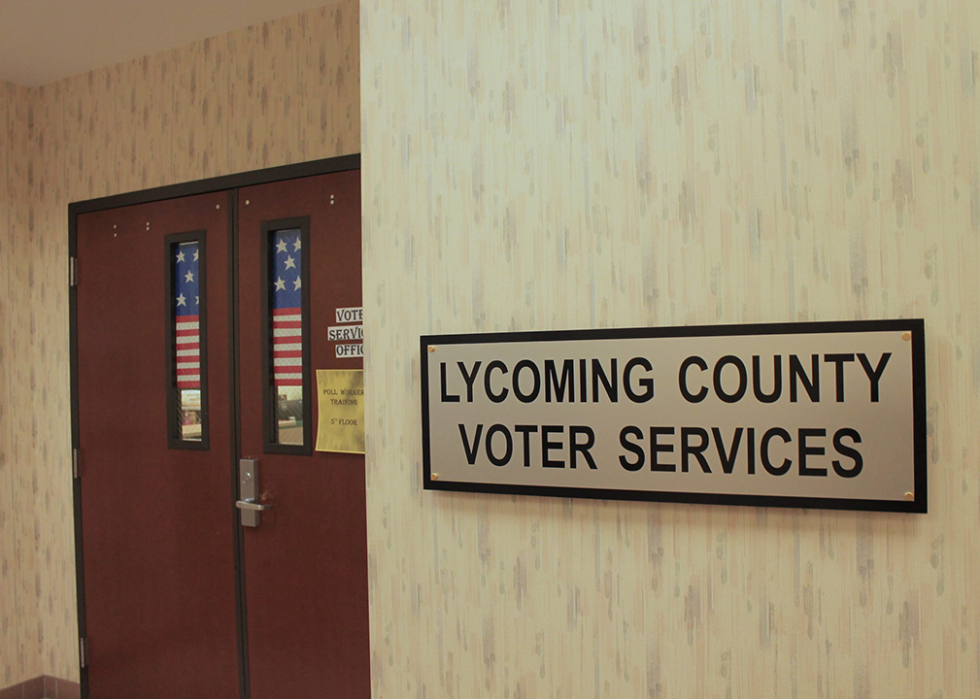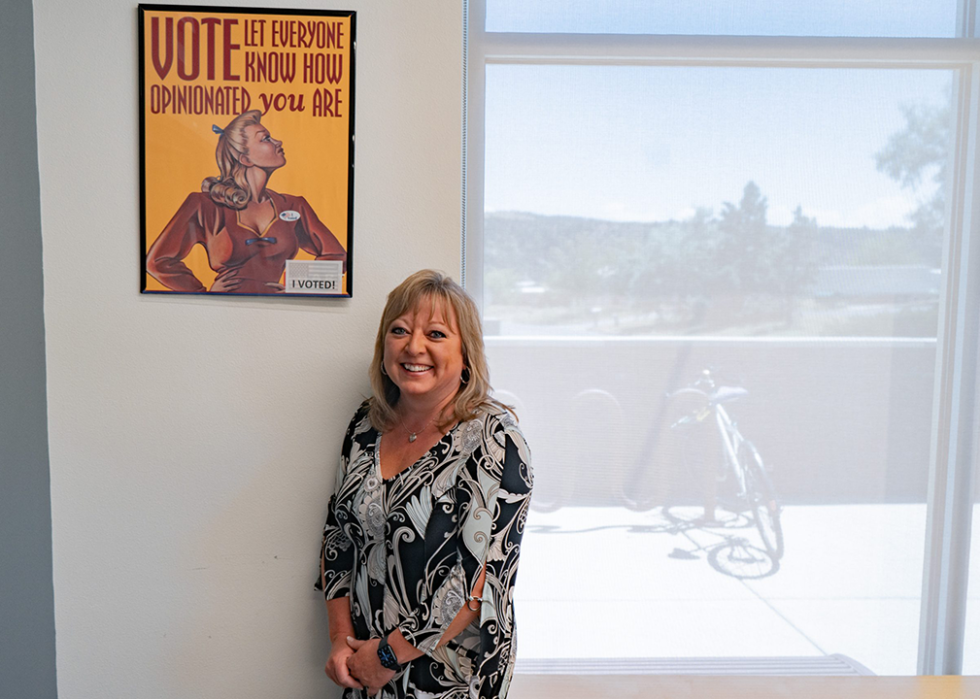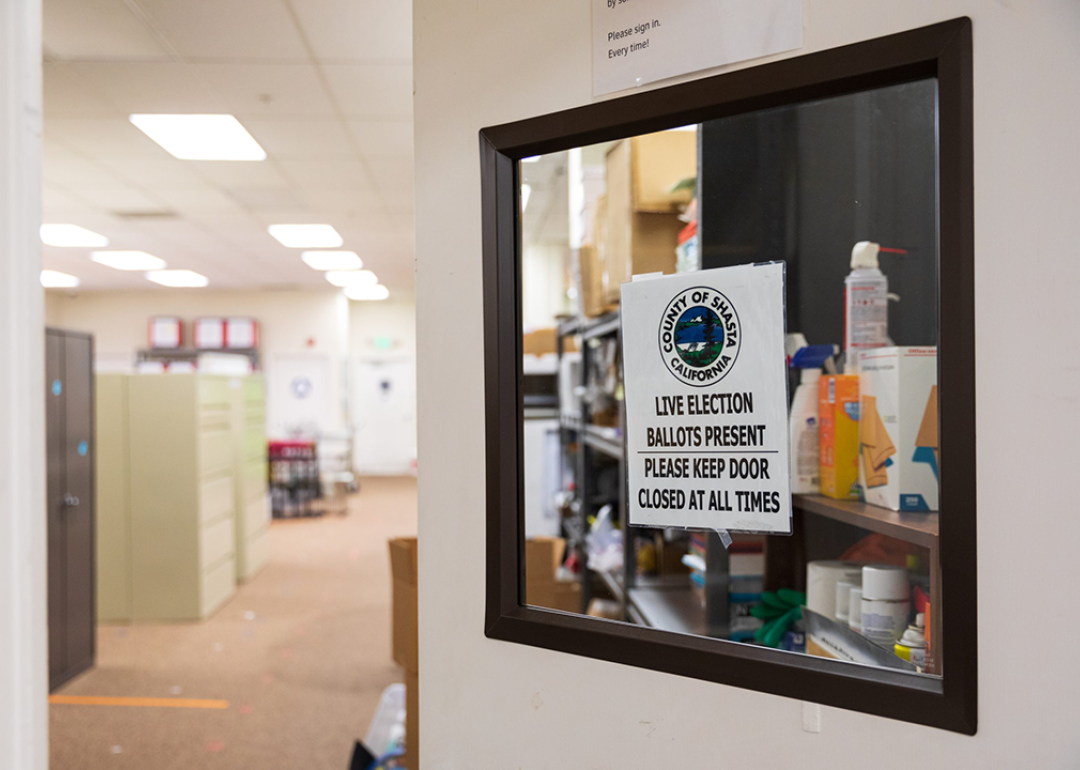Election deniers focus recruitment in 'out of the way places'

Election deniers are now putting energy into grassroots organizing, a quieter version of the loud-and-proud campaigning led by Trump that occurred in the movement's nascent days.
"They're kind of spreading the [erroneous] word about how voting machines particularly are stealing elections, and they're encouraging people to put in Freedom of Information Act-types of requests and at the extreme, encouraging let's just say impolite behavior toward election officials," said Charles H. Stewart, a professor of political science at the Massachusetts Institute of Technology, in a Daily Yonder interview. Stewart published research in early 2023 exploring the characteristics that lead people to the election denial movement.
"The thing that we're seeing in 2020 that we didn't see in 2016, or in 2012 or other times when these sorts of [election integrity] questions arose, is that we now have about a half-dozen of these traveling road shows," Stewart said. Few of these "road shows" are held in major cities, according to Stewart.
An NPR analysis of grassroots election denial events between January 6, 2021, and June 30, 2022, showed that the gatherings occurred in nearly every state. The events hit major cities like Minneapolis, St. Louis, and Washington, D.C. But they tended to steer toward the suburbs, smaller metropolitan areas, and in some cases, rural counties.
In Pennsylvania, for example, the NPR database shows there were no events in the city of Pittsburgh, but four counties within the Pittsburgh metropolitan area did have events. Philadelphia had one event, and there were two in the city's surrounding counties. Only one Pennsylvania event on the NPR list was in a nonmetropolitan, or rural, county.
These in-person events distinguish the election denial movement from other far-right conspiracies that have existed primarily online.
"The election integrity movement is distinct from something like QAnon, which was by and large an online phenomenon," said Stanford University's Grimmer. "Here, I think it's reversed."
While people are getting some of their information about election denialism online, Grimmer said, the real force of the movement comes from the in-person meetings. "Individuals are coming together, discussing the things that they think are surprising or suspicious in their local elections and then actually going out in their community and doing something," Grimmer said.
This played out in Lycoming County, Pennsylvania, a small metropolitan area with about 114,000 residents. In January 2023 a local election denial group successfully petitioned for a recount of the 2020 presidential election. Most of the group's organizing has been conducted in-person at various community centers around Williamsport, Pennsylvania (population 28,000), the Lycoming County seat.
Poll workers recounted nearly 60,000 ballots by hand; the difference between the electronic and manually-counted ballots came in at just a handful of votes. Election officials attributed the difference to poorly-circled ovals on the ballot that the machine could not detect.
Lycoming County's elections director Forrest Lehman says the election denial group represents a loud minority in the community. "I think it's easy to walk up to somebody and get them to sign almost anything," Lehman told the Daily Yonder. "In doing this hand-count, probably 4,900 out of those 5,000 people [who signed the petition] are gonna say, OK, well fine. I guess the results were correct."
But it's the other 100 people who are driving the movement in rural areas like Lycoming County, Lehman said.
Even after the hand-count results showed no proof of fraud in the electronically-counted ballots, the local election denial group has doubled down on their accusations, inviting election denier Sam Faddis, a retired CIA officer, to speak at their meetings. Like the election deniers touring nationally (such as Mike Lindell and Seth Keshel), Faddis has toured Pennsylvania to speak with other election denial groups.
"They allege that our vote totals were off by thousands based on these questionable statistical analyses that are being peddled not only in this state, but in a lot of places by a couple big names that keep coming up," Lehman said.

Nearly 2,000 miles to the west of Lycoming County, a county clerk is experiencing similar accusations fueled by the election denial movement's main talking points.
In La Plata County, Colorado, an influx of open records requests have poured in since 2020 challenging the election tools the county uses, which include Dominion Voting Systems – an electronic voting hardware and software company – and mail-in ballots. The county has relied on mail-in ballots since 1992.
"What's happened to us is people from the outside and different organizations that don't have anything to do with our local communities are attacking us because 'Oh my gosh, you have Dominion or you use mail ballots and we don't trust you,'" said La Plata County Clerk Tiffany Lee (pictured) in a Daily Yonder interview. "That's been really hard on us."
Most of the open records requests use the same language provided by state and national election denial groups, Lee said.
Lee has not experienced the violent threats other election officials have received (a Maricopa County, Arizona election official received death threats through voicemail in 2021, for example), but her office is on high alert, especially as they move into the 2024 presidential election year.
And they have good reason to be.
In 2021, the U.S. Department of Justice established the Election Threats Task Force to investigate threats to election workers, which they identified as on the rise post-2020.
In the task force's first year, more than 1,000 threats were reported, and approximately 11% of them met the requirements for federal criminal investigation, according to a press release. Of the potentially criminal threats, 58% of them were in states with post-election lawsuits, audits, and recounts.
In May 2023, the Department of Homeland Security released a national terrorism advisory bulletin that warns of a heightened domestic violence threat moving into the 2024 election year. The causes for this violence include individuals' "perceptions of the 2024 general election cycle and legislative or judicial decisions pertaining to sociopolitical issues." The advisory expires November 23, 2023.
The psychological toll these threats take on election workers is severe: In Colorado, 23 of the state's 64 county clerks were new to the office last year, according to Lee. This high turnover poses another risk to the elections process.
"If we chase off election workers with this insanity, we're going to make elections run more poorly," said Grimmer from Stanford University. "We'll be hemorrhaging so much experience and expertise for no reason other than the sort of falsehoods that are in people's brains."
As election officials gear up for local and state elections this November and a presidential election next year, county clerks are preparing to head off even more fraud accusations.
Rural county clerks hope their communities will trust them through the process.
"We're just here to do our jobs," Lee said. "Just like your county treasurer, your county assessor, your coroner, your surveyor; your county clerks are the same. We're just administrators of the law.
"And I hope that rural communities across the United States understand that, that we're just human beings doing good work for the people's voices to be heard."
This story was produced by The Daily Yonder and reviewed and distributed by Stacker Media.
